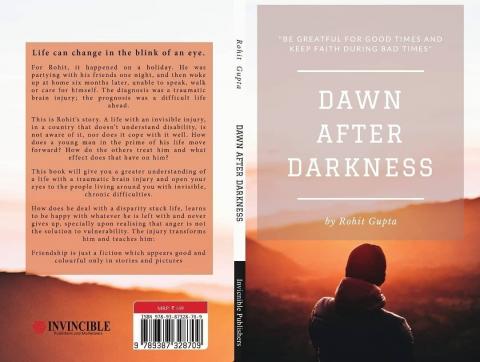Shivani Maheshwari who interviewed Rohit Gupta , the author of Dawn After Darkness, reviews the book and details why she thinks it is a useful resource for a person with Traumatic Brain Injury and their family.
It is distressful to read about Traumatic Brain Injury (TBI), more so when it is the chronicle of a vivacious, extrovert 21-year-old gearing up to take off in life with ambitious plans and dreams. When such a life comes to a crushing halt in a flash of a second with a slip from a balcony of the second floor. When what follows is deep coma, devastating injuries, bleak chances of survival and 10 years of gruelling therapy and rehabilitation.
This is the story of Rohit Gupta, Traumatic Brain Injury survivor, who felt compelled to write about his agonizing struggles and recovery in ‘Dawn After Darkness’ published in 2018, seven years after his catastrophic accident. It gives a first-hand description of view of life with traumatic brain injury and creates awareness about a host of accompanying invisible difficulties.
Written in a simple language and style, the book is fraught with raw emotions, including intense depression, anger experienced over the last ten years since the accident. Rohit even talks candidly about suicidal thoughts and calling up Suicide Help Lines. Though not fully recovered, he is still working on his speech and balance, his optic nerve is paralysed, his journey and perseverance has been extremely inspirational.
The book would have been more prized if Rohit had delineated the rehabilitation programme giving details and particulars with his own example and progress. Accounts of speech therapy, hydrotherapy, even physiotherapy, would provide a crucial dimension to the book and would help in understanding the rehabilitation programme better. Wish there was more of it!
Rohit addresses questions on rehabilitation in his interview here
But at the end of the slim 84-page book, there is optimism as indicative in the title ‘Dawn After Darkness’. In one of the last chapters, he writes “I want to concentrate on getting back in shape and to be independent. I want to drive my own car, walk my dog and do plenty of other stuff. I don’t want to be dependent on others for anything.”
The last page with 10 TBI key pointers are encouraging and impactful. Example -
- "You are tired, frustrated and crestfallen but you are still capable of going further."
- "Focus on your present situation rather than impending dreams."
‘Dawn After Darkness’ makes for motivational read especially for TBI patients, families, caregivers and others wanting to follow the arc of a survivor.
Link to the book by clicking on the image of the book cover







